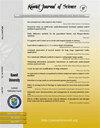Impact of sol-gel synthesized α-aluminium oxide nanoparticles for the enhancement of transformer oil insulation properties
IF 1.2
4区 综合性期刊
Q3 MULTIDISCIPLINARY SCIENCES
引用次数: 0
Abstract
Transformers require advanced insulating materials that outperform mineral oil in terms of cooling, insulation effectiveness, eco-friendliness, and operational efficiency in extreme operational and weather conditions. As a result, emphasis has shifted to renewable and ecologically friendly materials. This change in emphasis is motivated by worries about the environment, fuel shortages, and the disposal of waste oil. Transformers have historically employed solid insulators like paper and pressboard as well as mineral or synthetic oil. However, the development of ecologically friendly insulating materials has been spurred by new environmental regulations as well as economic benefits. This research investigates the use of sol-gel synthesized aluminium oxide (Al2O3) nanoparticles to improve the insulation properties of host transformer oil. The synthesized aluminium nanoparticles were characterized with X-ray diffractometer (XRD) and found rhombohedral structure, whose chemical composition was studied by energy dispersive X-ray spectrum (EDAX). Investigation using Fourier transform infrared spectroscopy (FTIR) also revealed the production of AlOOH and hydroxyl vibrational bands at wavenumbers of 690 and 2976 cm-1, respectively. Studies using field emission scanning electron microscopy (FESEM) showed that the nanoparticles are spherical in form and have a diameter of around 38 nm. Additionally, the incorporation of α-aluminium oxide nanoparticles into the host oil showed an improvement in the breakdown voltage and suggested a possible use for better transformer oil insulation.
溶胶-凝胶合成的 α-氧化铝纳米粒子对提高变压器油绝缘性能的影响
变压器需要先进的绝缘材料,这些材料在冷却、绝缘效果、生态友好性以及极端运行和天气条件下的运行效率方面都优于矿物油。因此,重点已转向可再生和生态友好型材料。对环境、燃料短缺和废油处理的担忧促成了这一重点的转变。变压器历来使用纸和压纸板等固体绝缘材料以及矿物油或合成油。然而,新的环保法规和经济效益推动了生态友好型绝缘材料的发展。本研究探讨了利用溶胶凝胶合成的纳米氧化铝(Al2O3)颗粒来改善变压器主机油的绝缘性能。用 X 射线衍射仪(XRD)对合成的纳米铝粒子进行了表征,发现其具有斜方体结构,并用能量色散 X 射线光谱(EDAX)对其化学成分进行了研究。利用傅立叶变换红外光谱(FTIR)进行的研究还发现,在 690 和 2976 cm-1 波长处分别产生了 AlOOH 和羟基振动带。利用场发射扫描电子显微镜(FESEM)进行的研究表明,纳米颗粒呈球形,直径约为 38 纳米。此外,将 α- 氧化铝纳米粒子加入主油中还能提高击穿电压,并可用于改善变压器油的绝缘性能。
本文章由计算机程序翻译,如有差异,请以英文原文为准。
求助全文
约1分钟内获得全文
求助全文
来源期刊

Kuwait Journal of Science
MULTIDISCIPLINARY SCIENCES-
CiteScore
1.60
自引率
28.60%
发文量
132
期刊介绍:
Kuwait Journal of Science (KJS) is indexed and abstracted by major publishing houses such as Chemical Abstract, Science Citation Index, Current contents, Mathematics Abstract, Micribiological Abstracts etc. KJS publishes peer-review articles in various fields of Science including Mathematics, Computer Science, Physics, Statistics, Biology, Chemistry and Earth & Environmental Sciences. In addition, it also aims to bring the results of scientific research carried out under a variety of intellectual traditions and organizations to the attention of specialized scholarly readership. As such, the publisher expects the submission of original manuscripts which contain analysis and solutions about important theoretical, empirical and normative issues.
 求助内容:
求助内容: 应助结果提醒方式:
应助结果提醒方式:


